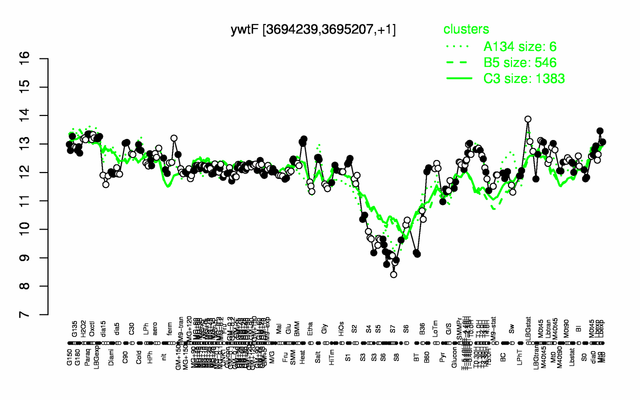TagT
Revision as of 11:25, 17 April 2014 by 134.76.70.252 (talk)
- Description: phosphotransferase, attaches teichoic acid, teichuronic acid, or acidic capsular polysaccharide to cell wall peptidoglycan via phosphodiester linkage to N-acteylmuramic acid
| Gene name | ywtF |
| Synonyms | |
| Essential | no |
| Product | phosphotransferase, responsible for attachment of anionic polymers to peptidoglycan |
| Function | transfer of anionic cell wall polymers from lipid-linked precursors to peptidoglycan |
| Gene expression levels in SubtiExpress: tagT | |
| Interactions involving this protein in SubtInteract: TagT | |
| MW, pI | 35 kDa, 9.554 |
| Gene length, protein length | 966 bp, 322 aa |
| Immediate neighbours | ywtG, ywtE |
| Sequences | Protein DNA DNA_with_flanks |
Genetic context 
This image was kindly provided by SubtiList
| |
Expression at a glance PubMed
| |
Contents
Categories containing this gene/protein
cell wall synthesis, cell envelope stress proteins (controlled by SigM, V, W, X, Y), membrane proteins
This gene is a member of the following regulons
The gene
Basic information
- Locus tag: BSU35840
Phenotypes of a mutant
- a tagT mutant has no phenoype, the triple tagT tagU tagV mutant is unable to grow under normal conditions PubMed
Database entries
- BsubCyc: BSU35840
- DBTBS entry: [1]
- SubtiList entry: [2]
Additional information
The protein
Basic information/ Evolution
- Catalyzed reaction/ biological activity:
- Protein family: LytR-Cps2a-Psr family PubMed
Extended information on the protein
- Kinetic information:
- Domains:
- Modification:
- Cofactor(s): Mg(2+) PubMed
- Effectors of protein activity:
Database entries
- BsubCyc: BSU35840
- UniProt: Q7WY78
- KEGG entry: [3]
- E.C. number:
Additional information
Expression and regulation
- Operon: ywtF PubMed
- Regulatory mechanism:
- Additional information:
Biological materials
- Mutant:
- Expression vector:
- lacZ fusion:
- GFP fusion:
- two-hybrid system:
- Antibody:
Labs working on this gene/protein
Your additional remarks
References